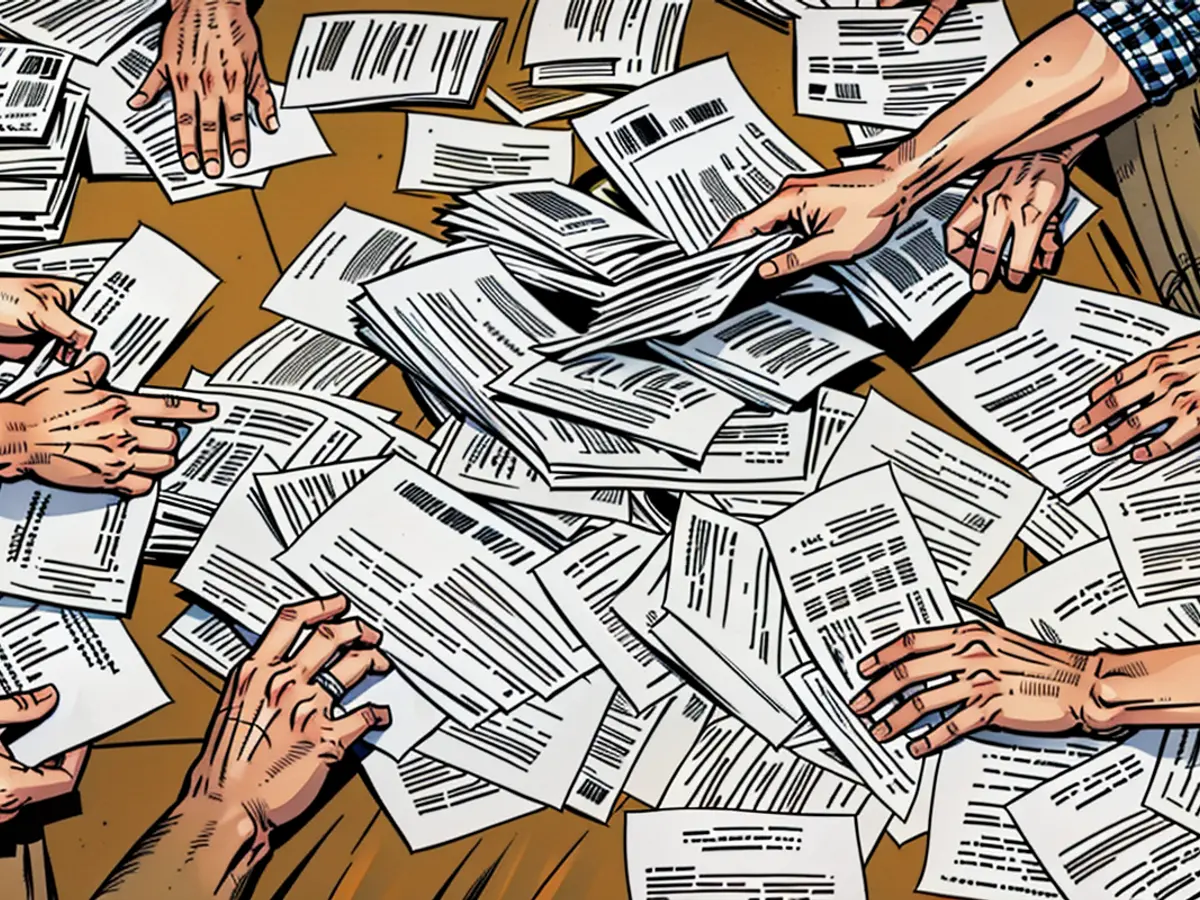Voting events - Saxony's European elections see the AfD leading, BSW comes in third place.
In the recent European elections, the Alternative for Germany (AfD) secured a substantial victory in Saxony with 31.8% of the votes, up from their 25.3% share in the previous election. The party also performed strongly in major cities like Leipzig, Chemnitz, and Dresden.
The Christian Democratic Union (CDU), led by Michael Kretschmer, finished second with a mere 21.8% of the votes, down compared to their 23.0% result five years ago. The Left Bloc, a new political party, garnered 12.6% of the votes, marking its presence.
Jörg Urban, AfD's state leader, expressed satisfaction with the initial calculations on Sunday night, proudly announcing that his party had become the second-strongest force in Germany. He was particularly delighted to see the Greens' significant dip in support.
The Greens suffered a dramatic setback, with only 5.9% of the votes, far below their 15.7% result in the previous election, leading their state leader Anna Cavazzini to lament the missed potential. She indicated the need to delve further into why her party had failed to achieve its goals, striving to increase its influence in the future.
With this emphatic success, the AfD has reaffirmed its position as a leading force in Germany, having won previous federal and European elections in the region. The party had been dubbed a "secured right-wing extremist tendency" by the Office for the Protection of the Constitution in December 2023 due to its controversial statements and controversies. Their victory in Saxony further solidifies their prominence in German politics.
Meanwhile, the incumbent Social Democratic Party (SPD) mustered only 6.9% of the votes, followed by the Greens with 5.9% and the Left with 4.9%. As a result, the Saxon SPD's Matthias Ecke expressed his disappointment, acknowledging the challenging election campaign that included both verbal and physical attacks.
Zimmermann, the lead for the Left Bloc, remained enthusiastic about her party's performance, stressing their game-changing impact on the German political landscape. Significantly, a new party was able to surpass the five-percent threshold in the national average, a unique feat.
For the next state elections on September 1, 2024, Zimmermann believes the landscape will be vastly different, as many people were once undecided about which party to cast their vote for. Ecke, the Saxon SPD candidate, voiced his dissatisfaction with the result and highlighted the importance of learning from the violence and intimidation his party faced.
In Saxony, almost 3.3 million people cast their votes on Sunday, with the post-election analysis slated to begin early Monday. In Dresden, various parties presented their thoughts at a "post-election discussion" led by Uwe Dierks, the CDU's General Secretary.
Despite falling short of initial estimates, the AfD made significant gains throughout the state. They secured the top spot in eight of the ten districts, with Vogtlandkreis going to the AfD with 28.3% of the votes, narrowly edging out the CDU's 27.4% share. The full statewide result of the AfD's success is evident in this electoral triumph, exhibiting their rising influence.
Read also:
The SPD's Matthias Ecke, acknowledging the challenges of the election campaign, expressed disappointment over the party's 6.9% result. Ecke emphasized the importance of learning from the violence and intimidation faced by his party.
Sabine Zimmermann, lead for the Left Bloc, remained optimistic about their performance, highlighting the party's impact on the German political landscape. With over 12.6% of the votes, the Left Bloc surpassed the five-percent threshold, making it a unique feat for a new party.
In contrast, Sahra Wagenknecht, a prominent figure in the Left Bloc, voiced her concerns about the party's failure to achieve better results in the European elections. Wagenknecht emphasized the need for the Left Bloc to improve its strategies and appeals to a broader audience.
In the midst of the European elections, Matthias Ecke of the SPD and Sahra Wagenknecht from the Left Bloc faced verbal attacks, adding to the tensions between the two parties. Meanwhile, Anna Cavazzini, the Greens' state leader, grappled with their significant dip in support, down to 5.9% from their previous 15.7%.
Despite the AfD's victory in Saxony, European elections saw the SPD receiving only 14.8% of the votes nationwide. Matthias Ecke, SPD's parliamentary group leader, criticized the party's European election campaign, stating that it was not a "good night" for the party.
Kamenz, a town located in Saxony, saw a shift in the political landscape, with the SPD and Greens garnering fewer votes compared to the past election. The shift paved the way for parties like the AfD and the CDU to gain ground in the area.
Both AfD's Jörg Urban and SPD's Matthias Ecke called for unity within their respective parties post-elections. Urban highlighted the need to maintain internal cohesion in the AfD, while Ecke stressed the importance of rebuilding and rejuvenating the SPD in the region.
The EU-wide European elections saw the AfD making substantial gains across Germany, symbolizing a growing disillusionment with traditional political parties. In the state of Saxony, the AfD won 31.8% of the votes, surpassing the incumbent CDU and solidifying its position as a leading force in German politics.
The Clara Zetkin Hall in Dresden hosted a post-election discussion, where representatives from various parties expressed their thoughts on the election results. The CDU's General Secretary Uwe Dierks led the discussion, providing an opportunity for different perspectives on the recent European elections in Saxony.








